As cat owners, dealing with the challenge of a cat peeing everywhere can be quite frustrating. When our furry friends choose places outside of their litter box for peeing, it’s often not just a one-time accident.
Persistent behavior like this can indicate underlying health issues or stress. Getting to the root of why your cat is peeing everywhere is crucial in effectively addressing and controlling the issue.
There are many reasons why a cat may start peeing outside the litter box. In some cases, the litter box itself may be the problem. Let’s dive into the topic so that you can see what resonates with your situation and what you can do about it.
Coming Up In The Article
- Understanding cat pee habits
- Cat urine chart
- Why is my cat peeing outside the litter box?
- How to react
- Preventing accidents
- How to stop re-offending
- Cat pee & health
- What about cat poop?
- When to call the vet
- FAQs
Understanding Your Cat’s Pee Habits
Cats are known for their fastidious nature, and one of the things that they are known to be most particular about is their litter box habits. Of course, every cat is different, but understanding what is normal for your cat can help you identify when something is wrong.
Normal urination patterns
Cats typically urinate one to two times a day, and their urine should be pale yellow in color and have a mild odor. They also tend to bury their urine in litter boxes or outside in soil. If your cat is not burying their urine when they normally do, it could be a sign of a problem.
Signs of problematic urination
If your cat is peeing outside of their litter box or in inappropriate places, it could be a sign of a problem. Scratching the walls near the litter box or the sides of litter tray may be a sign that your cat doesn’t like something about their litter box.
Other signs of problematic urination include straining to urinate, frequent urination, blood in the urine, and excessive licking of the genital area. If you notice any of these signs, it is important to take your cat to the vet for a checkup.
Cat Urine Chart
Here’s an informative “at a glance” chart below that quickly illustrates the various aspects of cat urine health. From spotting the difference between normal and worrisome urine colors to understanding changes in urination patterns, this graphic is your go-to guide. It’s super handy for figuring out whether your cat’s behavior is just a quirk or a cry for help.
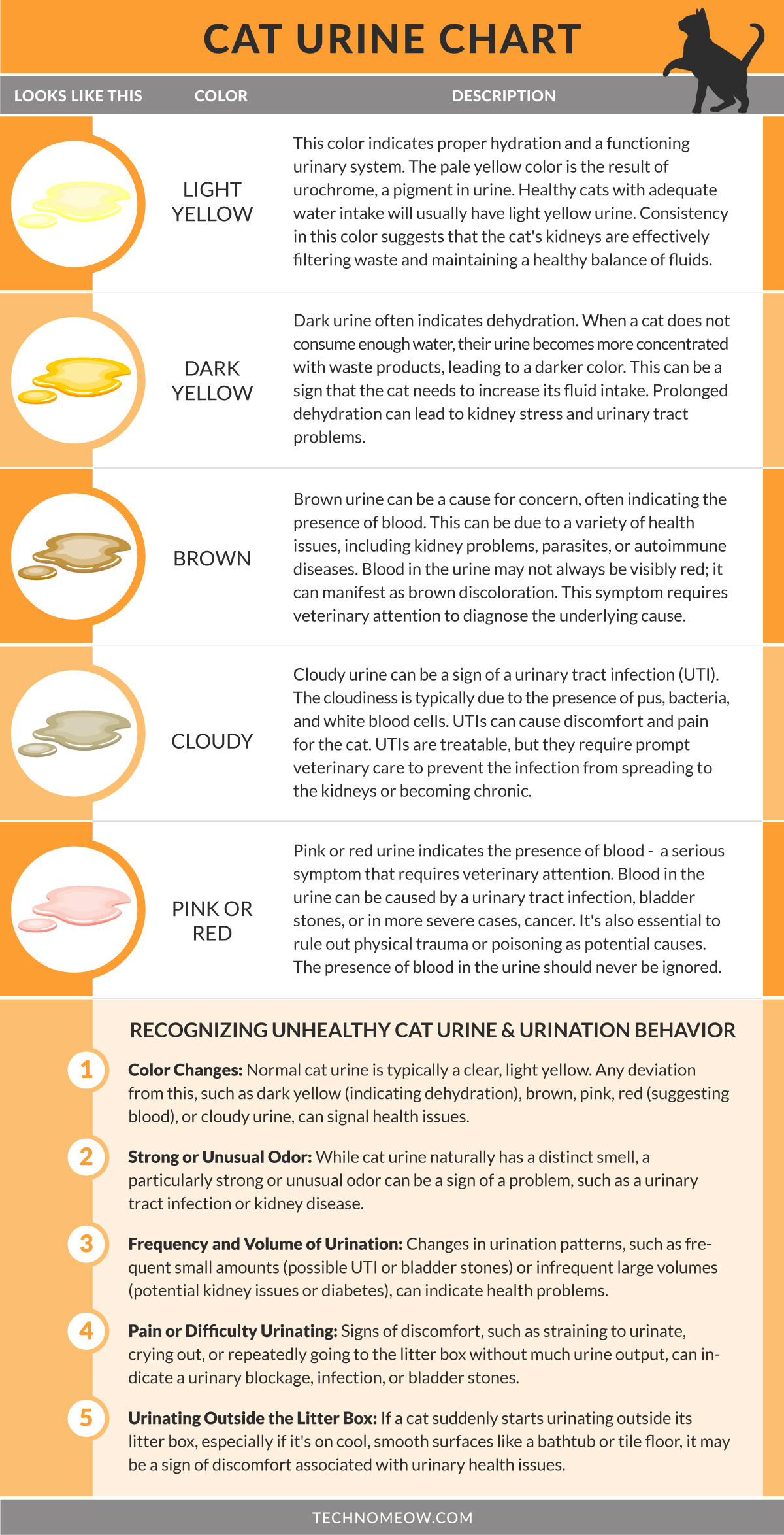
Why Is My Cat Peeing Outside The Litter Box?
Age-related reasons
Age is a common reason for cats peeing outside the litter box. Sometimes it’s nothing to worry about, but it can be.
Kittens
It’s not uncommon for kittens to occasionally miss the litter box as they are still learning proper bathroom etiquette. This can be attributed to excitement and developing bodies. However, consistent inappropriate urination in kittens may indicate a medical issue or that a stronger training routine is needed.
Senior cats
Similarly, senior cats may experience difficulties due to age-related health problems like arthritis and cognitive decline. So if it happens continually, you must speak to your vet. Physical problems like arthritis can be managed through supplements, pain medication, lifestyle changes, and therapies, whilst cognitive decline may require some extra TLC and lifestyle/home adaptations, like incontinence diapers.
Medical causes
Inappropriate urination in cats can be caused by underlying medical issues, so take note of other signs and symptoms and take your cat to see their vet ASAP if you suspect a problem. Here are some of the most common issues that can cause a cat to pee outside of the litter box.
Urinary tract infections (UTIs)
Urinary tract infections or UTIs are one of the biggest causes of urinary incontinence as they cause cats to need to pee more often. If a cat has a UTI, they may also associate the litter box with pain and avoid it.
They’re caused by bacteria that enter the urinary tract and cause inflammation. Other symptoms can include straining to urinate and blood in the pee. Prolonged infections without treatment can result in bladder scarring, which can cause long term incontinence, so it’s important to get them treated. This typically involves antibiotics prescribed by a vet.
Feline idiopathic cystitis
Feline idiopathic cystitis (FIC) is a condition that causes inflammation of the bladder in cats. The exact cause of FIC is unknown, but it is believed to be related to stress. Symptoms of FIC include frequent urination, straining to urinate, and blood in the urine. Treatment for FIC in cats may involve medication to manage pain and inflammation, as well as changes to the cat’s environment or lifestyle to eliminate stress.
Bladder stones
Bladder stones are crystalline structures that form in the urinary tract. In cats, it can cause an increased need to pee, as well as straining to urinate, blood in urine, and general discomfort. If left untreated, it can lead to serious complications, like urinary tract obstruction.
So, it’s important to get diagnosed with vet attention. This will include scans like x-rays or ultrasounds and treatment options can include dietary changes or surgical removal in extreme cases.
Metabolic issues
Metabolic issues in cats, such as diabetes, can lead to inappropriate urination outside the litter box. Cats with diabetes may exhibit increased thirst and weight loss, as well as excessive urination. Addressing these issues requires vet tests and often a combination of lifestyle changes, medication, and supportive care.
Kidney problems
Kidney issues, such as kidney disease or kidney failure, can also cause cats to urinate outside the litter box. When the kidneys are not functioning properly, it can also cause weight loss, decreased appetite, and lethargy. Treatment may involve medication, changes to the cat’s diet, and fluid therapy.
Behavioral causes
There can also be Behavioral causes for your cat peeing everywhere.
Stress & anxiety
Like in humans, stress and anxiety can cause the body to go into overdrive, resulting in excessive peeing, pooping, and shedding, as well as excessive grooming or even aggression in extreme cases.
Common causes of stress in cats include life changes like moving house or grief. Traumatic experiences, phobias, and separation anxiety can also cause ongoing stress, as well as loneliness and lack of physical and mental stimulation.
Stress caused by lifestyle changes can be relieved by providing a stable daily routine and lots of love and affection, whilst ongoing behavioral issues can be treated with positive association training. Anti-anxiety products and medications can help, too.
Be sure to keep your cat active and entertained to reduce stress, loneliness, and boredom with lots of interaction, exercise, and play with things like exercise wheels, scratch posts, and motion-activated toys. If you’re really struggling, don’t be afraid to ask a vet or behaviorist for help.
Territorial marking
Cats are territorial animals and may start urinating outside the litter box to mark their territory. This behavior is more common in male cats that have not been neutered, but females may also mark their territory, especially if they are feeling threatened or insecure.
Neutering will help male cats, but providing fun things to do around the house, as well as plenty of love and affection is crucial. New additions and changes around the home should be introduced gradually and eased in with positive associations.
You should also provide enough litter boxes and separate beds and feeding stations for each cat, in separate areas of the home if necessary.
Lack of training
Lack of training can also cause inappropriate urination in cats. Of course, this is to be expected in young kittens, as mentioned above, especially in those who were separated from their mothers too early, but it may also occur with rescue cats who have not had training or socialisation in their previous life.
Litter box avoidance
Sometimes, cats avoid their litter box due to discomfort from cleanliness issues. Cats may also avoid them due to the box being the wrong size or type, or due to the litter being an unfavourable texture or scent. So be sure to clean your litter box regularly and keep at least one box for each cat you have. Another option would be to get an automatic self-cleaning cat litter box.
How To React To Accidents
If your cat pees outside of your litter box, the first thing you need to do is clean the area with a pet-safe enzymatic cleaner, preferably one designed for pet pee, or make your own with white vinegar and baking soda.
Not only does this keep your come clean and safe and get rid of any bad cat urine smell, but certain ingredients like citrus and vinegar can prevent your cat from wanting to mark the same spot again. Remain calm and never punish your pet for having an accident.
Instead, focus on redirecting them to the litter box and reinforcing good behavior with treats and praise.

Preventing Accidents
Follow these tips to prevent accidents outside the litter box in the future.
Litter box training
To train a cat to use the litter box, start by placing them in it after their meals and whenever they wake up from a nap. Positive reinforcement is key, so always praise them or give them a tasty treat when they use it correctly.
Remember to be patient and consistent and never punish your cat for getting it wrong, as they won’t understand why they’re being punished. This can create stress and actually increase the likelihood of accidents around the home, as well as ruin your bond.
Litter box hygiene
Proper hygiene, size, and placement is essential to maintaining a good attitude towards using the litter box in your cat’s mind. To keep your cat’s litter box clean, scoop it every day or look into using a self-cleaning litter box to prevent bacteria build-up, stop the spread of illness between cats, and keep it pleasant for them to use.
You should also wash the litter box with soap and water once a week and remember to provide enough litter boxes for your cats. It’s recommended that each cat within a home has a minimum of two litter boxes.
Litter box size & placement
Your cat’s litter box should be one and a half times the length of their body, and they need to be able to dig, so make sure your litter box tray can hold litter with a depth of at least 6 cm.
Most cats prefer open litter boxes, but some prefer enclosed ones. Senior cats and cats with mobility issues also need boxes with low walls to step into them with ease.
You should also place them in a quiet, private place in the home, and make sure that it’s easily accessible if your cat is older or disabled. If you have cats that aren’t fond of one another, you should place their respective litter boxes in separate places to stop any negative associations being made.
Litter preferences
If you’ve got a fussy kitty, experiment with different types of litter to see what they like. Some prefer a sandy or clay-based litter, while others like wood pellets or crystals. They may also have scent preferences, too. Most cats prefer unscented litter, but sometimes, scents can encourage them to use their litter box. There are also great cat litter subscription services which help to make sure you always have great kitty litter coming in at regular intervals so you never run out and you’re keeping your litter box clean and fresh.
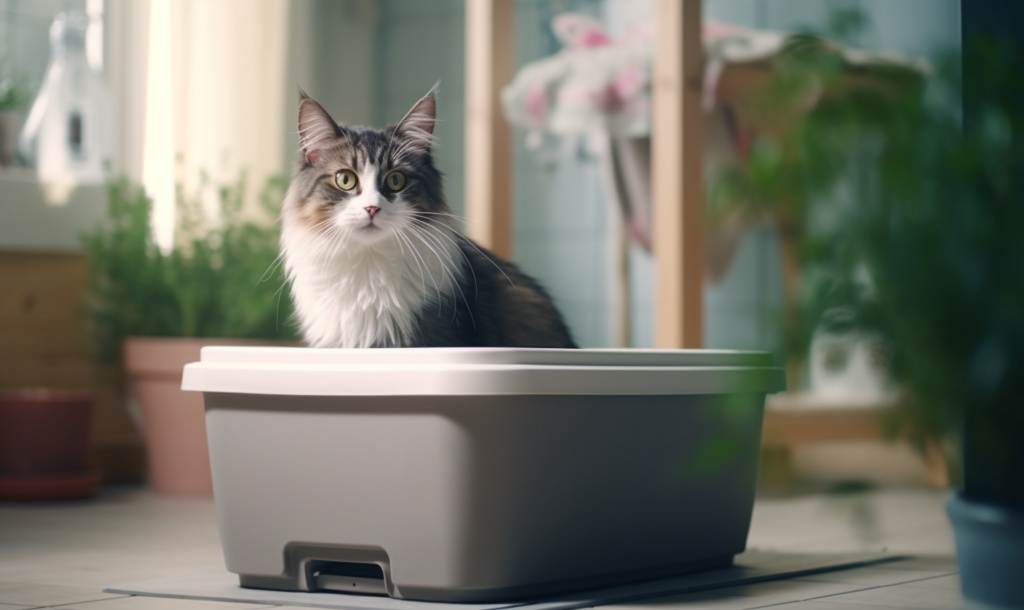
Routine & lifestyle
Establishing a consistent routine is crucial for encouraging good litter box habits, especially in senior cats. By feeding them on a consistent schedule, you’ll encourage regular drinking and reduce the likelihood of accidents around the home.
As mentioned above, maintaining a fulfilling lifestyle with lots of love, activity, and fun will reduce stress and decrease the likelihood of accidents around the home.
Helpful products
As mentioned above, scented litters can encourage cats to use their litter boxes, so experiment to find out what your cat likes. Alternatively, sensitive cats may prefer unscented ones. Self-cleaning litter boxes are super helpful for keeping your cat’s litter box clean and maintaining a good attitude towards it.
For cats with urinary incontinence, incontinence products like cat diapers can offer a practical solution to the problem whilst maintaining household cleanliness, as well as hygiene and independence for your cat.
Vet check-ups
Finally, be sure to take your cat to their annual health check-ups at the vet to monitor their health and get advice on how best to care for them as they age and change.
How To Stop Re-offending
If your cat has peed outside of their litter box for a behavioral reason, using a deterrent spray or natural deterrent like vinegar, lavender, citrus, or peppermint can discourage them from peeing in the same place again.
You can also try restricting their access to the area if they develop a fondness for peeing in a particular place in your home, or moving their litter box on top of the area to encourage better habits.
Significance of Cat Pee
It’s not just your cat’s pee habits that can tell you if something is wrong. The urine itself can provide valuable insights into their health, too. Changes in cat urine color, odor, frequency, or difficulty urinating may indicate issues like urinary tract infections, kidney problems, or diabetes.
To help you keep a closer eye on your cat’s health, you can also buy health-monitoring cat litters that change color if your cat’s urine has abnormal pH levels, which can point to specific problems. For example, high alkaline levels can suggest conditions like urinary tract infections or metabolic disorders, whilst high levels of acidity can point to issues like metabolic acidosis.
What About Cat Poop?
Your cat’s poop can also let you know if there’s a problem in their body. By checking the color, consistency, and smell of their poop, you can get a pretty good indication of their gastrointestinal heath. Check out our article on what’s normal and what’s not when it comes to cat poop here for more information!
When To Call The Vet
It’s important to remember that accidents happen. However, if your cat is suddenly peeing outside the litter box consistently or you notice any other strange behaviors or physical changes, it’s crucial to consult your vet as soon as you can.
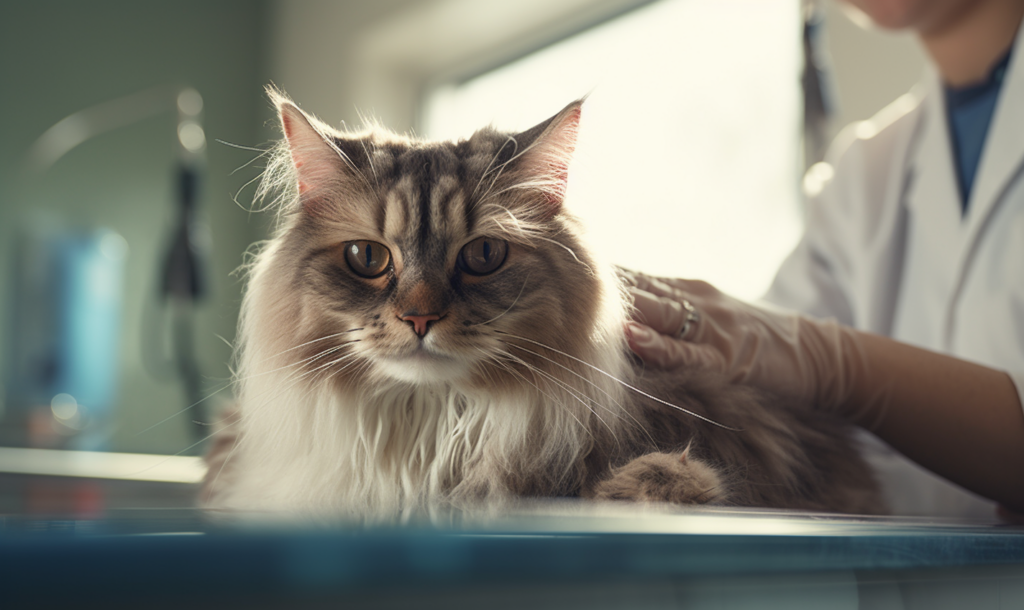
Any abrupt change in litter box behavior could indicate underlying health issues, such as urinary tract infections, diabetes, or kidney problems. Additionally, senior cats may need permanent lifestyle changes.
If your cat is straining to urinate, crying in pain, peeing blood, or unable to produce any urine, you should take your cat to see the vet immediately.
FAQs
Should I punish my cat for peeing outside the litter box?
No! You should never punish a pet for having accidents around the home. It is not their fault. Even when there is an underlying behavioral problem, this is an issue that you, as their owner, are responsible for fixing!
Is it normal for senior cats to pee outside the litter box?
Yes, it can be normal for senior cats to have accidents from time to time. This can be due to age-related health issues such as arthritis or kidney problems. Consult your vet for guidance and look into incontinence diapers if it becomes a consistent problem.
Why might my cat suddenly start peeing outside the litter box?
Cats may pee outside the litter box due to old age, illness, or stress. They can also take a disliking to their litter box if something changes or if it’s not clean. If this isn’t the case, keep an eye on your cat’s behavior and if it persists or you notice any other changes, talk to your vet.
Are there specific types of litter that cats prefer?
Every car is different, some have scent preferences, and others prefer unscented. However, a lot of them seem to prefer clumping litter with a fine texture. So, experiment to see what your cat likes best!
Why is my cat digging in their litter box?
Cats are supposed to dig in their litter box. This is actually a sign that they like their litter box and are happy to use it – it is a positive behavior. If they stop doing this or scratch the inside of the tray or the walls around it, it can be a sign they don’t like something about the box.
How frequently should I clean my cat’s litter box?
You should scoop the litter box on a daily basis and clean the box and change the litter once a week to keep it clean and keep your cat from avoiding using it.
Final Thoughts
Understanding your cat’s daily habits is pretty important. If something is wrong, especially when it comes to something like pee and poop, it’s crucial to pay close attention. If you notice your cat peeing outside of their litter box regularly and the litter box itself is fine, you should promptly contact your vet.
Be sure to keep their litter box clean and tell your vet about any other symptoms or changes in your cat’s behavior that your notice. We hope that this guide will help you to keep your cat happy and healthy. Let us know your thoughts down below!

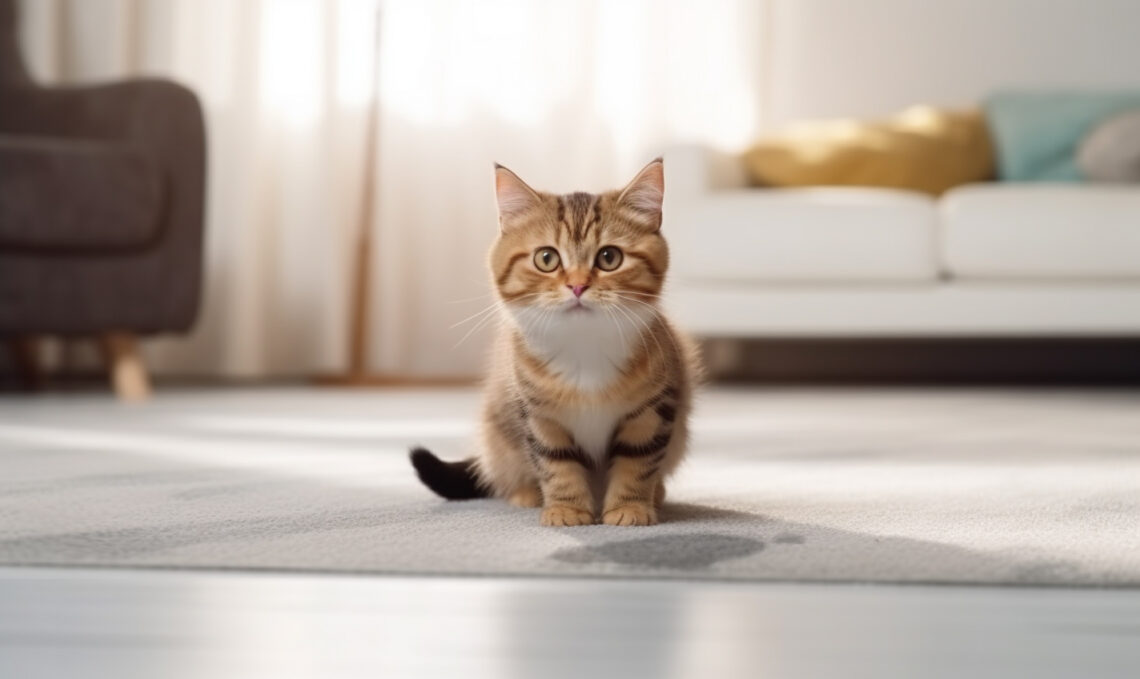
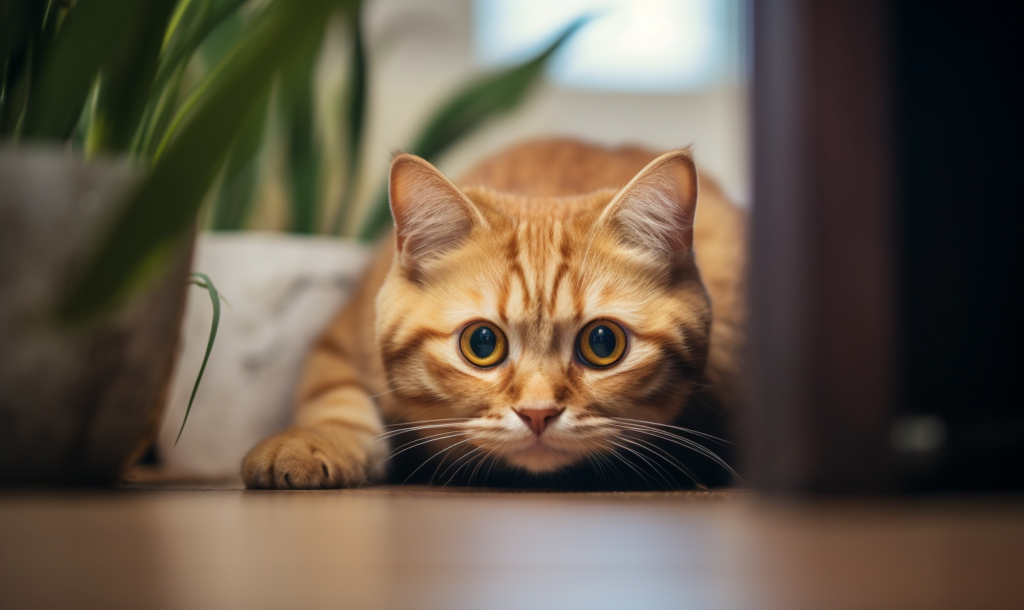








Leave a Comment